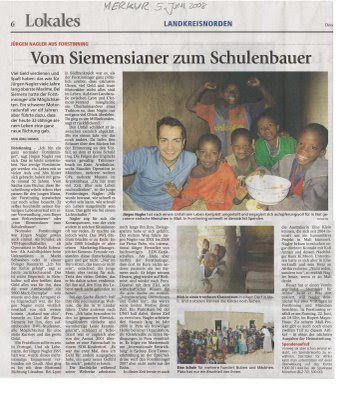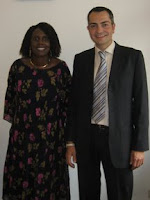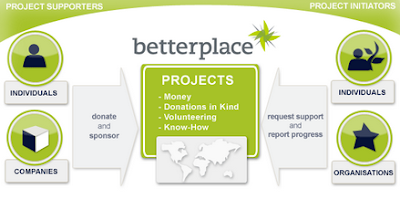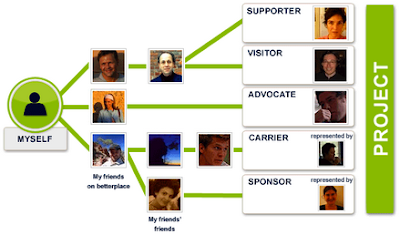
Thanks to a recommendation from my friend Mike Smith I got interviewed by
A Developed World:
Juergen Nagler was enjoying successful career in the business world a couple of years ago when he was almost killed in a motorbike accident. He realized then that he wanted to do something more meaningful than sitting in an office cubicle and contributing to a corporation’s bottom line.
He started the Mali Initiative in February 2007 with a young Australian Elise Klein and a Malian community leader Youchaou Traore. Together, they have built a not-for-profit network of committed individuals and organizations to provide access to quality education in Mali, in order to break the cycle of poverty.
Education in Mali
Mali is one of the least developed countries in the world according to the United Nations, which estimates that its Gross Domestic Product (GDP) per capita was only US$1000 in 2007. Its young population of 12 million people, of which 50% are under the age of 15, comprises of Muslims, Christians and other ethnic groups living side-by-side. However, the lack of access to quality education have left the people in Mali felt disempowered.
Juergen explains: “The challenges in Mali were almost incomprehensible for a Western-mind: 7 out of 10 people in Mali cannot read and write, poverty and unemployment are dire and the country is dependent of foreign aid.”
Juergen strongly advocates Nelson Mandela’s belief that education is "the most powerful weapon you can use to change the world”. Education can enable a child to improve his chances of finding a job and providing for his family, to exercise his choices as an inform citizen living in a democracy, and then to finally pass on the baton to all future generations.
Local networks, local knowledge
The Mali Initiative takes a unique approach by developing local networks and partnerships and using local knowledge to build their projects focused on education and empowerment. All projects are lead by locals in order to create sustainable results. By taking time to understand local aspirations, Juergen and his team has been able to mobilize the community and use their raw energy and motivation to drive the projects.
Since 2004, they have raised $200,000, which have gone towards multiple projects such as launching a micro-credit organization for women,establishing a health center, getting street children to learn French, and establishing the Youchaou's School to provide quality primary and secondary education in Kalabacoro (on the outskirts of Mali’s capital Bamako). The school is considered one of the best in Mali and will be used for teacher-training in partnership with local representatives of the Ministry of Education.
"One World"Backpacking through Africa and South America, it dawned on Juergen that the divide between the West and the rest of the world was just an illusion. “At the core, aren’t we all striving for our families to live in peace with proper shelter, education and healthcare?” This belief has fueled his commitment to work towards healing the divisions and creating "one world".
“Connecting heart to heart with the people of Niamana, a rural community in Mali without roads, electricity or running water, has made my sacrifices worthwhile,” he said.
Juergen’s vision for the Mali Initiative is to develop “a million of projects rather million-dollar-projects” that are sustainable and provide opportunities for the locals. He believes that everyone has the responsibility, in any decision they make, to direct their energies towards positive social change.
Make it Happen!
The Mali Initiative is registered as a charitable organization in Mali, Australia and Germany. They are looking to build an arm of the organization in the United States. If the initiative resonates with you and you would like to bring this organization to North America please contact Juergen Nagler at
juergen.nagler@mali-initiative.org.
There are also other ways to get involved:
Participate in the Mali Initiative’s fundraising events
Join one of their Goodwill Trips to Mali
Volunteer in Mali or from home- Volunteers that speak French are definitely an asset to spreading the message and volunteering in Mali.
Donate to the cause:
-US$100 buys learning materials -US$200 a year of street child education sponsorship -US$2000 buys furniture and teachings aids for a classroom -US$7,000 secures a year of street children education for 35 kids -US$13,000 builds a classroom
For more information see:
http://www.mali-initiative.org/A Developed World is "an action-oriented social publication that uncovers the stories behind the work of social entrepreneurs and visionary leaders, who are changing lives around the world":
http://adevelopedworld.com/
 Recently I had the chance to attend the Xmas gathering of betterplace.org in Berlin. I have blogged about them before and during this visit a new ‘scene’ of social entrepreneurs in Berlin came to my attention.
Recently I had the chance to attend the Xmas gathering of betterplace.org in Berlin. I have blogged about them before and during this visit a new ‘scene’ of social entrepreneurs in Berlin came to my attention.







